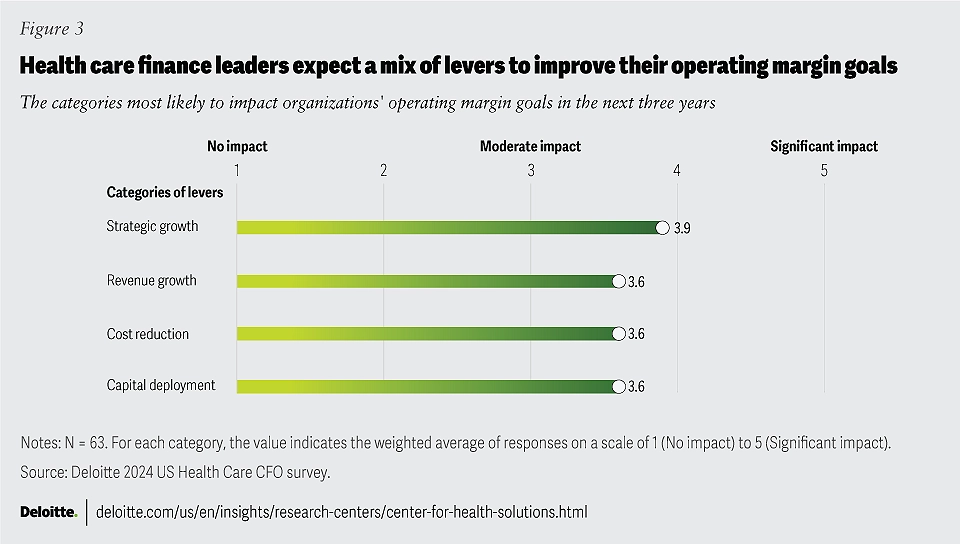The healthcare industry has faced significant profitability challenges over the past decade, with these difficulties intensifying since the COVID-19 pandemic. This financial strain has hindered organisations in their mission to deliver innovative, high-quality, equitable, and affordable care. Healthcare finance leaders have traditionally focused on cost reduction to boost profitability. However, in the face of economic volatility, workforce management issues, and supply chain disruptions, many CFOs are now exploring innovative tools and methods to enhance financial performance.
The Limitations of Cost Reduction
Deloitte’s annual healthcare finance leaders survey has consistently identified cost reduction as a top organisational priority. However, recent findings indicate a shift in focus. The survey, which included over 60 finance leaders from U.S. health plans and health systems, revealed that solely focusing on cost reduction is insufficient. About 25% of the finance leaders reported that their operating margins fell short of their goals over the past three years. Improving margins has become increasingly challenging with persistent economic and inflation pressures, workforce struggles, evolving utilisation trends, increasing competition, and supply chain problems. Thus, finance leaders now recognise the need for new tools and profitability levers, as cost reduction ranked last among top priorities in 2024.
Diversifying Margin Improvement Strategies
Improving operating margins is a key priority for 78% of surveyed finance leaders, who plan to enhance margins by three or more percentage points over the next three years. To achieve these goals, a comprehensive mix of operating margin transformation levers across four major categories—strategic growth, revenue growth, cost reduction, and capital deployment—is crucial. Marketing and branding emerged as top strategic growth priorities, with better network management, member retention, and cross-selling opportunities also identified as high-priority growth levers. Healthcare organisations are boosting their digital marketing efforts to better connect with their audience despite the increased risk of ensuring patient privacy and data security.

Image Source: Deloitte
Finance leaders are also exploring nontraditional revenue models, with nearly two-thirds planning venture investments in health or non-health startups within the next two years. Emerging technologies like generative AI are being leveraged for workforce management strategies, leading to potential cost savings. Optimising the workforce, particularly important in light of employee turnover and burnout, is identified as a primary lever for cost reduction. The strategic use of technology can improve efficiency and foster a sense of purpose within the healthcare workforce.
Financial Restructuring and Capital Deployment
Financial restructuring is another top priority for health system CFOs. This involves the readjustment of assets and liabilities to strengthen the capital structure. This approach includes reassessing real estate plans, evaluating the necessity of various locations, consolidating services, and providing patients with alternative care settings. Many healthcare organisations are shifting their focus toward establishing smaller, more cost-effective facilities rather than building larger ones. Health plans also consider financial restructuring to determine which assets to grow or phase out to meet growth goals.
While some levers may be low-priority, they could provide better opportunities for margin improvement. Optimising the product and service mix, pursuing alliances and ecosystems, and exploring outsourcing and offshoring opportunities are areas that could significantly impact profitability. For instance, outsourcing administrative functions to less expensive labour markets can reduce costs on salaries, benefits, and overhead. Additionally, digital and AI technologies, though seen as longer-term solutions, can potentially improve medical coding, authorisation processes, and customer relationship management, among other areas.
Healthcare organisations must adopt a comprehensive approach to improving profitability, moving beyond cost reduction to embrace strategic growth, revenue growth, and capital deployment. Finance leaders are crucial in broadening their organisation’s perspective and prioritising investments based on expected returns, implementation costs, available funds, and time to value. Looking ahead, finance leaders are well-positioned to spearhead transformative change and guide their organisations toward increased profitability. It is time to challenge the status quo and explore novel strategies that will reshape the financial landscape of the healthcare industry.
Source: Deloitte
Title Image: iStock






